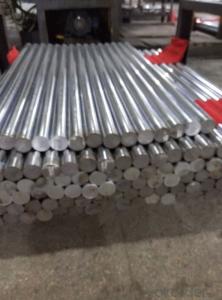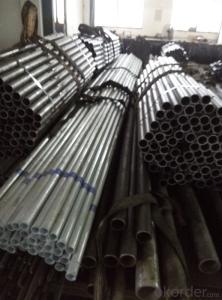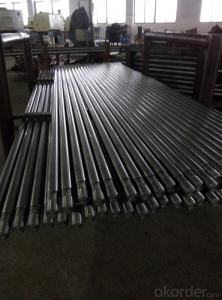Forged Steel AISI 4140 Alloy Steel Bars
- Loading Port:
- Tianjin
- Payment Terms:
- TT OR LC
- Min Order Qty:
- 25 m.t.
- Supply Capability:
- 500000 m.t./month
OKorder Service Pledge
OKorder Financial Service
You Might Also Like
Item specifice
Forged Steel AISI 4140 Alloy Steel Bars
Product Details:
1.Materail:Alloy Steel, Carbon Steel, Stainless Steel,etc
2.Length≤12m
3.OD≤Φ100~Φ1200
4.Ground and chrome plated
5.ISO9001:2008
6.competitive price
7.excellent service.
8.Strict quality control
9.Prompt delivery
Chemical Composition:
C | Si | Mn | Cr | Ni | Mo |
Equal or less than | |||||
0.37-0.45 | 0.17~0.37 | 0.90-1.20 | 0.90-1.20 | 0.20-0.30 | 0.20-0.30 |
Features:
1) Outer diameter: 15 - 80mm
2) Tube wall thickness: 1 - 8mm
3) Outer diameter: ± 0.01 mm
4) Inside diameter: ± 0.01mm
Delivery status: NBK(+N) BK(+C) BKW+(LC) BKS(SR)
Application:
AISI 4140 is a grade of steel an excellent material for such uses as gears, piston pins, crankshafts,and shafts.It is commonly used for a variety of applications in the oil and gas industry. Examples of applications for 4140 steel also include structural tubing,connection rods, stem assemblies, tool holders,tubes for transportation of pressurized gases.4140 Alloy Steel/SAE 4140 Steel Price is engineering steel supplied in quenched and tempered conditions. Very good machinability. High toughness. High creep strength. Repeated impact resistant capability.
Product Show:
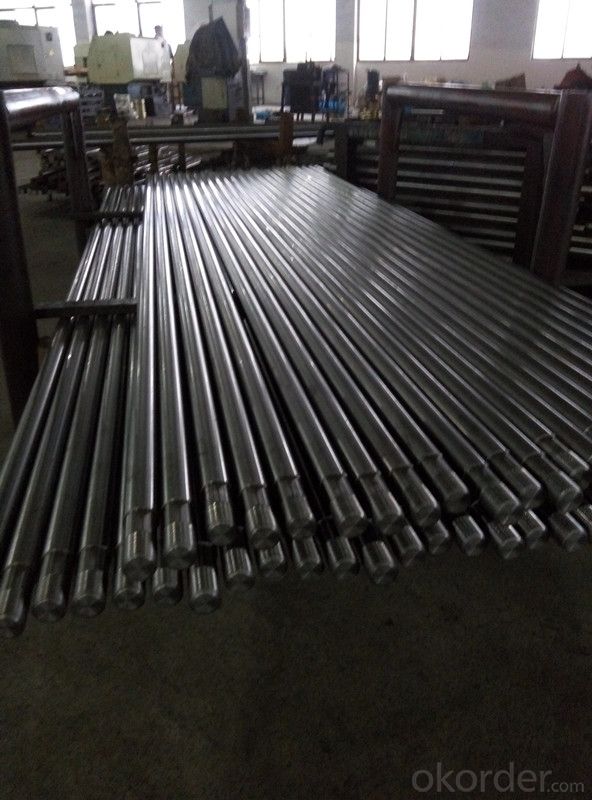
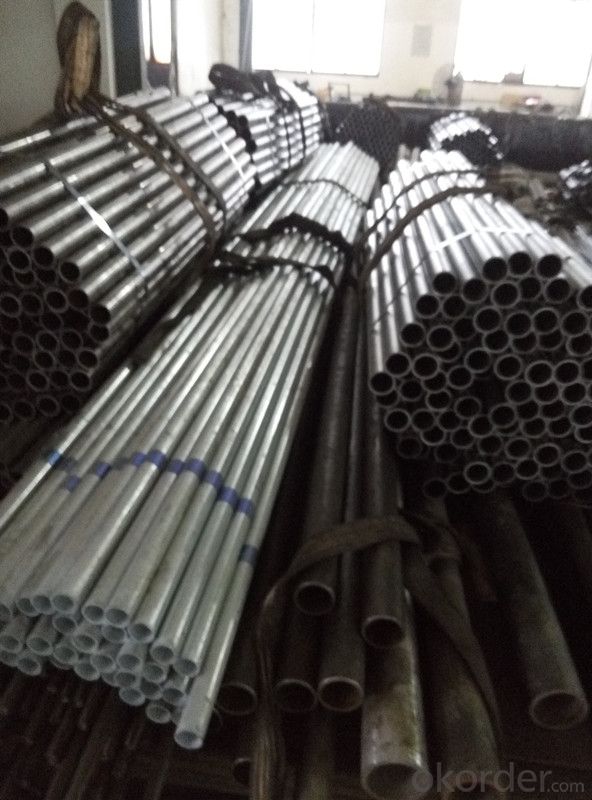
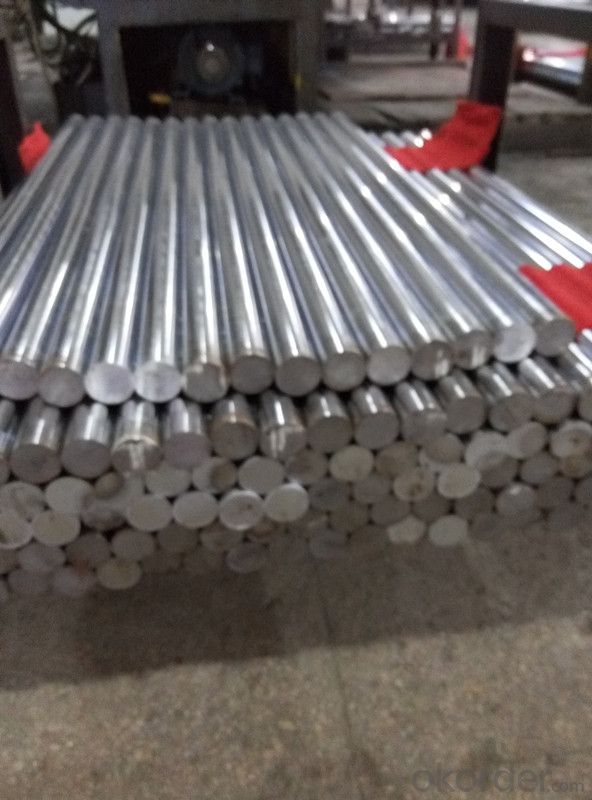
- Q:What are the main factors that affect the machinability of special steel?
- The main factors that affect the machinability of special steel include the steel's chemical composition, microstructure, hardness, and the presence of impurities or non-metallic inclusions. Additionally, factors such as cutting tool material, cutting speed, feed rate, and coolant usage also influence machinability.
- Q:What are the different food processing grades of special steel?
- In the food industry, there are numerous special steel grades used for food processing. These grades are tailor-made to meet the stringent requirements of food processing, guaranteeing product safety and quality. One widely employed grade of special steel for food processing is AISI 304 stainless steel. This grade is renowned for its exceptional resistance to corrosion, making it suitable for environments where food is processed. Additionally, it exhibits high resistance to chemicals and acids, enhancing its suitability for food processing applications. Another frequently utilized grade in the food industry is AISI 316 stainless steel. This grade offers superior corrosion resistance compared to AISI 304 and is commonly employed in applications involving direct contact between equipment and food or food-related substances. Furthermore, AISI 316 stainless steel withstands high temperatures, making it suitable for use in food processing operations that involve intense heat. Moreover, specific food processing grades of special steel have been developed for environments with stringent hygiene requirements. These grades, such as AISI 316L and 1.4404, possess a smoother surface finish, preventing bacterial buildup and facilitating easier cleaning. Overall, the various grades of special steel used in food processing offer different levels of resistance to corrosion, temperature, and hygiene. These characteristics ensure that the steel utilized in food processing equipment is durable, safe, and compliant with industry standards.
- Q:What are the different corrosion-resistant grades of special steel?
- There are several corrosion-resistant grades of special steel that are commonly used in various industries. These grades are specifically designed to resist corrosion and maintain their structural integrity in harsh environments. Some of the different corrosion-resistant grades of special steel are: 1. Stainless Steel: Stainless steel is one of the most popular corrosion-resistant grades and is widely used in various applications. It contains a minimum of 10.5% chromium, which forms a protective passive oxide layer on the surface, preventing corrosion. There are different types of stainless steel, such as austenitic, ferritic, and martensitic, each with varying levels of corrosion resistance. 2. Duplex Stainless Steel: Duplex stainless steel is a combination of austenitic and ferritic stainless steels, offering superior corrosion resistance compared to conventional stainless steel grades. It has a high chromium content, along with other alloying elements like molybdenum and nitrogen, which enhance its resistance to pitting, crevice corrosion, and stress corrosion cracking. 3. Super Duplex Stainless Steel: Super duplex stainless steel is an even higher corrosion-resistant grade than duplex stainless steel. It has a higher chromium and molybdenum content, providing excellent resistance to highly corrosive environments, such as seawater, chemicals, and acids. Super duplex stainless steel is commonly used in offshore oil and gas industries. 4. Nickel Alloys: Nickel alloys, such as Inconel and Hastelloy, are highly corrosion-resistant grades of special steel. These alloys have a high nickel content, along with other elements like chromium and molybdenum, which make them resistant to a wide range of corrosive environments, including high-temperature and acidic conditions. 5. Titanium Alloys: Titanium alloys are known for their exceptional corrosion resistance, especially in aggressive media, such as seawater and chemical processing environments. These alloys have a low density, high strength, and superior resistance to pitting, crevice corrosion, and stress corrosion cracking. 6. Aluminum Alloys: Certain aluminum alloys, such as 5052 and 6061, are also corrosion-resistant grades of special steel. These alloys have a protective oxide layer that forms on the surface, providing excellent resistance to atmospheric corrosion. Aluminum alloys are commonly used in marine and aerospace applications. These are just a few examples of the different corrosion-resistant grades of special steel. The selection of the appropriate grade depends on the specific corrosive environment, temperature, mechanical properties required, and other factors related to the intended application.
- Q:How does special steel contribute to the automotive racing industry?
- Special steel contributes to the automotive racing industry by providing high-strength and lightweight materials that enhance the performance and safety of race cars. These steel alloys are used in various components, such as engine parts, chassis, and suspension systems, allowing for improved speed, maneuverability, and durability. Additionally, special steel's exceptional heat resistance and ability to withstand extreme conditions make it vital for engines that generate immense power and operate at high temperatures. Overall, special steel plays a crucial role in pushing the boundaries of automotive racing technology and enabling teams to achieve optimal performance on the track.
- Q:What are the different types of mold steel?
- There are several different types of mold steel, including P20, H13, S7, and 420 stainless steel. Each type has its own unique properties and is used for specific applications in mold making and injection molding processes. P20 is a versatile mold steel that offers good machinability and wear resistance. H13 is a hot work tool steel known for its high heat resistance and toughness. S7 is a shock-resistant mold steel suitable for applications requiring high impact resistance. 420 stainless steel is corrosion resistant and commonly used for molds that require good polishing and texturing.
- Q:How does special steel perform in terms of high-temperature strength?
- Special steel typically performs very well in terms of high-temperature strength. It has excellent resistance to thermal fatigue, oxidation, and creep, allowing it to withstand extreme heat conditions without losing its structural integrity or mechanical properties. This makes special steel a preferred choice in applications where high-temperature strength is crucial, such as in the aerospace, power generation, and petrochemical industries.
- Q:What are the requirements for special steel used in military applications?
- The requirements for special steel used in military applications typically include high strength, toughness, and durability to withstand extreme conditions and heavy impact. It should have excellent resistance to corrosion, wear, and fatigue to ensure long-term performance. The steel must also possess good weldability and machinability for ease of fabrication and maintenance. Additionally, it should meet stringent specifications and standards set by military organizations to ensure reliability, safety, and compatibility with other materials and systems.
- Q:How does special steel perform under high-temperature oxidation?
- Special steel is engineered to exhibit outstanding performance when exposed to high temperatures, particularly in terms of oxidation. It is fabricated utilizing alloys that possess a significant quantity of chromium, which generates a shielding chromium oxide layer on the steel's surface once confronted with elevated temperatures. This chromium oxide layer acts as a barrier, thwarting further oxidation and safeguarding the steel against corrosion. The generous amount of chromium present in special steel also heightens its resistance to scaling, which refers to the development of thick layers of oxide on the steel's surface. Scaling can compromise the steel's integrity and result in failure when subjected to high temperatures. Nonetheless, special steel retains its structural soundness even at elevated temperatures due to its capacity to resist scaling. Apart from chromium, special steel may contain additional alloying elements like nickel, molybdenum, and vanadium. These elements contribute to the steel's resistance to high-temperature oxidation by further augmenting the formation and stability of the protective oxide layer. Overall, special steel exhibits exceptional performance under high-temperature oxidation circumstances. Its distinctive composition and alloying elements enable it to establish a protective oxide layer, resist scaling, and retain its strength and integrity even at elevated temperatures. As a result, it is extensively utilized in various industries that involve high-temperature applications, including power generation, aerospace, and petrochemical industries.
- Q:How is heat-resistant steel used in high-temperature applications?
- Heat-resistant steel is used in high-temperature applications due to its ability to withstand elevated temperatures without losing its structural integrity. This type of steel is commonly used in industries such as aerospace, power generation, and petrochemicals, where it is essential to maintain the strength and performance of components exposed to extreme heat. Heat-resistant steel is used in the construction of furnaces, boilers, heat exchangers, and other equipment that operate under high temperatures, ensuring their reliability and longevity even in challenging environments.
- Q:What are the common challenges in heat treating special steel?
- Some common challenges in heat treating special steel include achieving the desired hardness and strength while minimizing distortion and cracking, ensuring uniform heat distribution throughout the steel, managing the transformation of phases during heating and cooling, controlling the formation of detrimental microstructures, and maintaining tight dimensional tolerances. Additionally, special steels may have specific alloying elements or compositions that require precise heat treatment processes to maximize their desired properties.
1. Manufacturer Overview |
|
|---|---|
| Location | |
| Year Established | |
| Annual Output Value | |
| Main Markets | |
| Company Certifications | |
2. Manufacturer Certificates |
|
|---|---|
| a) Certification Name | |
| Range | |
| Reference | |
| Validity Period | |
3. Manufacturer Capability |
|
|---|---|
| a)Trade Capacity | |
| Nearest Port | |
| Export Percentage | |
| No.of Employees in Trade Department | |
| Language Spoken: | |
| b)Factory Information | |
| Factory Size: | |
| No. of Production Lines | |
| Contract Manufacturing | |
| Product Price Range | |
Send your message to us
Forged Steel AISI 4140 Alloy Steel Bars
- Loading Port:
- Tianjin
- Payment Terms:
- TT OR LC
- Min Order Qty:
- 25 m.t.
- Supply Capability:
- 500000 m.t./month
OKorder Service Pledge
OKorder Financial Service
Similar products
New products
Hot products
Related keywords
